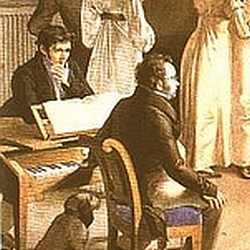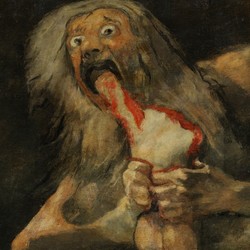
I could have borrowed the title of this article from one of Charles Dickens's works, Great Expectations, because 1816 for Franz Schubert was a year of hopes and expectations. However, his projects did not come out as he had hoped, and the subsequent disappointments ended up causing a change in his life.
As many of you will know, Franz Schubert's father was a teacher, and ran a school outside Vienna. His sons Ferdinand and Karl also worked there, and Franz has also worked there for one year. Herr Schubert applied for a more important and central school in August 1815, and his candidacy also included, as an added bonus, his three teacher children. Our Franz didn't like teaching, so moving to another school to keep teaching the little ones shouldn't have been very exciting. Thinking positively, changing school meant changing house, and surely the new one would be bigger. His mother had died when he was in boarding school, his father had married again and the house was once again filled with children. Franz had a piano in his bedroom, which he did not share with anyone. Even so, the shouts of the children playing and the crying followed him there and, conversely, his music made annoyance (“Franz, stop with the piano, the baby is sleeping!”
In February 1816, when the father's application was probably still pending, Franz began another procedure that, if everything went well, would allow him to change the little ones and the alphabet for adults and music. There was a vacancy for a music teacher at the school of teachers in Ljubljana (then part of the Austrian Empire) and he was very well-placed to get it. His age was against him, as he had not yet turned twenty, but his career was in his favor; Antonio Salieri endorsed him, attesting that Schubert had been an excellent student and was also an excellent musician.
No matter how excellent the composer Schubert was, he was still unknown, except for his close friends, an enthusiastic circle that was certain that his songs would be a success when they were published. However, the publishers did not want to risk losing money, so friends devised strategies to convince them. To seek Goethe's recognition was one of them; if the most respected and admired German-language literary figure were to sponsor a composer, no matter how young and unknown he was, his music would sell well. Josef von Spaun sent the great man a collection of carefully copied lieder, informing him of the merits of his friend Franz Schubert and begging him to accept that the work was dedicated to him. To give you an idea of the pearls that arrived at Weimar, the notebook included Gretchen am Spinnrade, Rastlose Liebe, Nähe des Geliebten, Meeresstille, Wanderers Nachtlied I, Heidenröslein, Erlkönig o Der König im Thule, among other songs.
The scores were returned without any explanation to Spaun, not even a small note. It's unknown what happened. Perhaps Goethe didn't like the songs (they were far from what he appreciated in the Lied). Perhaps they were not sufficiently recommended, or perhaps he did not even see them. He used to receive numerous such requests, and an army of secretaries might have filtered them. The point is that these wonderful songs were left unedited, and Goethe's rejection did quite harm Schubert's circle and Schubert himself. A circle that was not blinded by friendship and admiration: when they finally managed to publish a Lied by Schubert, in 1821, that Erlkönig, Op. 1, it was such a great success that it had to be reissued immediately.
Meanwhile, and we return to 1816, the father’s application was declined, with great regret on his part and probably on Ferdinand and Karl. Another disappointment for Franz came in September: he had been among the three finalists in the selection process of Ljubliana, but another teacher had won the place.
You can imagine that Schubert continued to compose during all these months of waiting; about all, Lieder, with a rhythm almost as frenetic as the previous year. If in 1815, the year we know as “the year of miracles”, he had written about one hundred and sixty lieder, in 1816 he would write about one hundred and thirty lieder. It has always been said that when Schubert felt pressured he composed at a very fast pace, and those two years had been complicated.
Finally, in December 1816 the apple of my eye decided to accept the invitation from Franz Schober's mother to live with them. No more classes for brats, no more noisy siblings, a big and quiet house, his soul mate next to him, and all the time in the world to write. And an implicit renunciation: the law established that a man was required to prove his economic solvency in order to obtain permission from the authorities to marry. Among the exempt professions was that of a teacher; leaving the school, Schubert also renounced marriage to Therese Grob, who seems to have patiently awaited him.
Among the Lieder he wrote in 1816 there is only one with a poem by Franz Schober, Am Bach im Frühling [By the brook in springtime]. Perhaps you recall a Lied from Winterreise (the seventh, Auf dem Flusse), where the poetic voice addresses the brook that, in the middle of winter, hides its impetus and its feelings under a crust of ice. In Schober's poem, we find a stream just after melting; the crust has broken and the water runs cheerfully, nourishing the moss and flowers in its path. The poetic voice welcomes it with sadness, unable to align his feelings with the joy of spring.
With these modest verses, Schubert wrote a surprising song that avoids the strophic form that may seem implicit. The first stanza, which talks about the freed brook and the joy it carries, has a simple accompaniment, which refers us to the movement of the water, and a beautiful melody that we hear twice. In the second stanza, the poetic voice speaks of his soul, so little in accordance with spring; Schubert now presents a new melody a little more animated, and repeats the last verse. In the third stanza, when the poet talks about his mood, we suddenly hear some declaimed words. The first two verses are almost violent; while the last two, are sad. Then the song starts again, repeating the first two stanzas.
It is a gorgeous Lied, preferred by both baritones and basses. Among many good versions, I have chosen the one by Konstantin Krimmel and Ammiel Bushakevitz because it is so beautiful that it wins your heart. Also, I want to provide an example of well-executed variations. During the time of Schubert, it was not uncommon for repetitions to be embellished with variations. Johan Michael Vogl came from the world of opera, where ornaments were almost mandatory, and he even added them in his editions of Schubert's Lieder. After that, the custom fell into disuse, but recently, we have heard variations again from time to time. Krimmel is one of the singers who does it, and I have not heard anyone who does it with such elegance and so much opportunity, to the point that something that is not natural sounds natural. Listen to it and, if you want, let us know what you think about adding more variations.
Du brachst sie nun die kalte Rinde,
Und rieselst froh und frei dahin;
Die Lüfte wehen wieder linde,
Und Moos und Gras wird neu und grün.
Allein - mit traurigem Gemüthe
Tret' ich wie sonst zu deiner Fluth,
Der Erde allgemeine Blüthe
Kommt meinem Herzen nicht zu gut.
Hier treiben immer gleiche Winde,
Kein Hoffen kommt in meinen Sinn -
Als daß ich hier ein Blümchen finde,
Blau, wie sie der Erinnrung blühn.
You have now broken your cold crust
and you ripple merrily and freely forth.
The breezes blow gently again,
and moss and grass grow new and green.
Alone and in a mournful mood
I walk by your waters as of old.
The blossoming of the earth
does my soul no good.
Here the same winds are ever driving me,
and no hope enters my mind,
even when I find a little flower here:
blue, like the flowers blooming in my memories.
(translation by Emily Ezust)
















